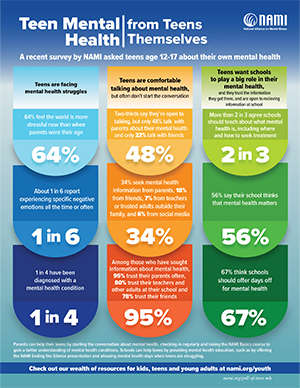
Adolescence is a crucial phase of life marked by physical, emotional, and social changes. With the challenges
of puberty, academics, peer pressure, and self-discovery, many teens experience mental health issues. This
article examines the importance of understanding and addressing these challenges to help teens navigate
adolescence successfully.
The Impact of Adolescence on Mental Health
During adolescence, the brain goes through significant developments that affect emotional regulation, decision-making,
and impulse control. The transition from childhood to adulthood is often accompanied by anxiety, mood swings, and
identity crises. Furthermore, societal expectations, academic pressures, and social media influence can exacerbate
these challenges, leading to mental health disorders such as depression, anxiety, and eating disorders.
Recognizing the Signs of Mental Health Issues
It is crucial for parents, teachers, and peers to be aware of the signs indicating potential mental health problems
in teenagers. These signs may include persistent sadness, sudden changes in behavior or academic performance,
withdrawal from social activities, irritability, or excessive worry. It is essential to create a safe and supportive
environment where teenagers feel comfortable discussing their concerns and seeking help.
Addressing Mental Health Concerns
When mental health issues arise, early intervention is vital. Teens should have access to mental health professionals,
counselors, or school psychologists who can provide guidance, support, and appropriate interventions. Moreover, parents
and caregivers should encourage open communication, actively listen, and validate their teen’s emotions. Additionally,
incorporating healthy lifestyle choices such as regular exercise, nutritious meals, and sufficient sleep can contribute
to managing mental health effectively.
The Role of Schools and Communities
Schools play a crucial role in promoting mental health awareness and providing resources for teenagers. Implementing
evidence-based programs that educate students about mental health, emotional well-being, stress management, and
coping strategies can empower teens to overcome challenges and build resilience. Likewise, communities should foster
an inclusive and supportive environment that reduces stigmas associated with mental health and encourages seeking help
when needed.
The Impact of Social Media
Social media has become an integral part of teenagers’ lives, shaping their self-perception and influencing their mental
health. The constant exposure to curated online content can lead to unrealistic expectations, feelings of inadequacy,
and cyberbullying. It is important to educate teens about responsible social media use, promote digital wellness,
and encourage real-life connections to mitigate the negative impact of social media on their mental well-being.
The Importance of Self-Care
Teaching teens the importance of self-care is crucial for their mental health. Encouraging activities like journaling,
engaging in hobbies, practicing mindfulness and relaxation techniques, and fostering healthy relationships can help
teens develop coping mechanisms to manage stress and improve their overall well-being.
Conclusion
Adolescence can be a challenging time, but with proper support, understanding, and intervention, teenage mental health
issues can be effectively managed. By prioritizing mental health awareness and providing the necessary resources,
we can assist teens in navigating adolescence, promoting their overall well-being, and empowering them to thrive
during this critical phase of life.

